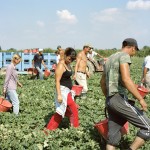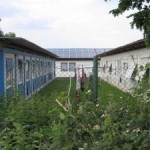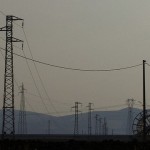Summarize : The appeal trial of a farmer who employed Senegalese irregularly, making them work up to 13 hours a day without ever paying for them, testifies to the existence of situations close form modern slavery in our land. Yet … Continue reading
Tag Archives: travailleurs migrants
Deadlocks of a society in crisis
Gallery
Summary: In the Andravida-Kyllini municipality, in 2014, it is a Greek citizen of Syrian origin who was elected mayor. The fact that he immigrated did not hinder his election, as, in the same time, Golden Dawn, fascist party of extreme … Continue reading
Between the prefabricated housing and asparagus fields ..
Summary:
Asparagus is a luxury vegetable very consumed in Germany, since 2003 she is the first producer in Europe. But the lack of a minimum wage applied to all professional sectors and the system of Minijob (short-term contracts, very few binding on the employer) causes many abuses of agricultural workers. The agricultural labor force employed in the collection of vegetables and fruits is almost essentially foreign. Polish Historically, there has been an influx of Romanians and Bulgarian recent years. Working conditions, hard because pickups techniques are often made worse by rights violations and lack of control tools.
The imposition of a minimum wage would be a first step towards more equality between national and foreign workers, but many blockages exist among employers. They fear not being able to withstand competition and pressure on prices, this is particularly true for those who sell their production outside of short circuits.
“The whole system is a fraud to the entire society” – Interview with Matthias Brümmer
In 2012, about 58 million pigs, 3.6 million cattle and 1 million sheep were slaughtered in Germany. The German meat industry is so effective that the country has become the slaughter of Europe, but also on the way to becoming the world’s largest meat exporter. With the start of the barbecue season, Lidl offers 20% per kilo of pork loin or € 3.99 per kilo. This award is achieved through the exploitation of workers, mostly East European countries. This with the help of the directive on the posting of workers to principles rather vague, leaving room for all kinds of abuse from shady supplier. Matthias Brümmer, head of the local branch of Oldenburg union for food and catering (NGG) explains how the business of cheap meat.
In search of a better life: photographing migrant workers
Gallery

This gallery contains 7 photos.
Migrant workers today: they cut our meat, they take care of our seniors, they harvest our fruits and vegetables and build our homes. The province to major cities, Bulgaria, Poland or Romania to Germany: they leave their countries in hopes … Continue reading
The network Faire Mobilität a step towards improving the working conditions of workers posted to Germany
Gallery

This gallery contains 2 photos.
Summary: Faire Mobilität The program was set up to make them more equitable conditions of living and working in Germany, addressing specifically to migrant workers. The six centers Faire Mobilität operate in networks, embedded in local and national levels. The actions are … Continue reading
The Dutch agriculture, or the excessive intensity of a production ?
Gallery
Summarize : To think about dutch agriculture can lead you, at least for some of you, to imagine colorful flower fields, green pasturelands lined by rivers and scattered by mills, browsed by black and white cows, sheep woolen … briefly, … Continue reading
“If you’re not happy, go away!”
Germany, the leading European food industry is increasingly criticized for the social and environmental price for its economic success. Only two weeks after my arrival in Lower Saxony, I have already seen the devastating effects of its operation. For years, thousands of posted workers suffer abuses of unscrupulous subcontractors. Through these “service contracts” large groups such as Tönnies, Danish Crown, Heidemark, Vion “rent” contract workers. These service contracts can circumvent the German labor law and to drastically cut wages. Beyond the damage suffered by the employees, this creates a problem of unfair competition. Most of these contract workers are from Eastern Europe (Romania, Poland, Bulgaria) and are subject to daily pressures. They are willing to accept conditions of living and working close to slavery, for fear of losing their jobs and having to return home without money.
Summary:
The testimonies of some former slaughterhouse workers report numerous violations of the rights of unsustainable rates, threats … Given the particular problem in the Lower Saxony region a consultancy mobile cell and access to rights was mounted in the program Faire Mobilität. More and more exploited workers use them. One of the counselors testify situations observed and the mafia look of subcontracting companies. For her the imposition of a minimum wage does present a partial solution if the checks were conducted on the workplace but also in life. According to her the exploitation of migrant workers in Lower Saxony receives little interest from public opinion, more concerned about the breeding conditions and slaughter of animals.
ECVC: Working group on migrant agricultural workers
Gallery

This gallery contains 1 photo.
27.02.2014 Press Release of ECVC (European coordination Via Campesina) Working group on migrant agricultural workers In recent years, the working group related to the issue of migrant agricultural workers in ECVC has gone through important moments of political and human … Continue reading
Eastern European immigrants in the Netherlands
This article gives an overview of migrants life and labor conditions in the dutch agriculture. It allows as well to have an idea of the way migrant labor force is managed at the institutional level.
Collective and social agriculture against industrial agriculture in Southern Germany
Gallery

This gallery contains 4 photos.
After nearly 3 months in Germany to work on migrant agricultural seasonal and the state of the peasant farming, I saw through the windows of my car monocultures of any kind, intensive breeding supply mega-installations, and funny big white bubble … Continue reading
Rosarno on sunday
Gallery
Summary: Rosarno looks like a disaster site, modeled by the violence of neoliberalism. Numerous seasonal workers go daily on the “piazza” hopping an hiring for the day. Outside these times the city seems dead, there are no public places where … Continue reading
Camps for Rosarno
Gallery
On January 17, Andrea Riccardi, Minister for Cooperation, Immigration and Integration in government Monti was visiting Rosarno (Calabria) to realize the situation. Each year, between the months of November and March, the municipality of 15,000 inhabitants “host” hundreds of seasonal … Continue reading
Kit Agricultural Migrant Workers’ Rights: Romanian & Polish
Gallery
The invisible workforce
Gallery

This gallery contains 10 photos.
SOUTH ITALY – THE INVISIBLE WORKFORCE In the agricultural zones of southern Italy, undocumented migrants move from one region to another, following the harvests in search of work. In August and September, the fields are dotted with tomato pickers. Segregated … Continue reading

